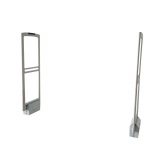RFID stickers have become a crucial component in various industries, adapting to the specific needs of businesses. These small, adhesive tags, armed with radio frequency identification (RFID) technology, are transforming the way companies operate. In this article, we will explore the versatility and benefits of RFID stickers across different sectors, and how they meet the demands of business-to-business (B2B) operations.
Understanding RFID stickers

RFID stickers are compact devices that utilize radio waves to transmit data. They consist of an RFID chip and an antenna, enclosed in a label or sticker format. These stickers can be easily attached to various products, assets, or even documents, providing a unique identification code that can be read by a compatible RFID reader.
The main advantage of RFID stickers lies in their ability to communicate wirelessly, without the need for direct line-of-sight. This allows for efficient and automated data collection, making them ideal for inventory management, supply chain optimization, and asset tracking.
Applications of RFID stickers in different industries
Retail and inventory management
- Streamlined inventory Control: RFID stickers enable retailers to track their inventory accurately in real-time, reducing the risk of stockouts and overstocking.
- Efficient point-of-sale (POS) systems: With RFID stickers, products can be automatically scanned and checked out, enhancing the speed and convenience of transactions.
Logistics and Supply Chain
- Enhanced tracking and traceability: RFID stickers enable end-to-end visibility in the supply chain, enabling companies to monitor the movement of goods, improve logistics efficiency, and reduce errors.
- Theft prevention: RFID stickers can be used as anti-counterfeiting measures, as they can be embedded with unique identification codes that verify product authenticity.
Healthcare
- Patient Safety and Identification: RFID stickers on medical bracelets or wristbands help ensure accurate patient identification, reducing the risk of medical errors.
- Asset Tracking: Hospitals and healthcare facilities can use RFID stickers to track medical equipment, ensuring their availability and preventing loss or theft.
Manufacturing and warehousing
- Workflow optimization: RFID stickers enable companies to track the progress of products throughout the manufacturing process, leading to better workflow management and increased efficiency.
- Inventory visibility: With RFID stickers, warehouse managers can accurately locate and track the movement of goods, improving inventory accuracy and minimizing manual errors.
Automotive industry
- Parts and component management: RFID stickers can help automotive manufacturers track and manage individual parts and components, improving inventory control and reducing assembly errors.
- Car rental and fleet management: RFID stickers can be used to quickly identify and locate vehicles, improving fleet management efficiency and reducing the time and effort required for manual checks.
5 Benefits of RFID stickers in B2B operations
RFID stickers offer numerous benefits in B2B operations, revolutionizing the way businesses operate and enhancing overall efficiency. From supply chain management to inventory control, RFID technology has the potential to streamline processes and drive productivity. Let’s delve into the key advantages of using RFID stickers in B2B operations.

1. Enhanced supply chain visibility
One of the primary benefits of RFID stickers in B2B operations is the enhanced supply chain visibility they provide. With RFID technology, businesses can track and monitor the movement of goods throughout the supply chain in real-time.
This real-time visibility enables businesses to gain insights into their supply chain processes, identify bottlenecks or inefficiencies, and make data-driven decisions to optimize their operations. RFID stickers also help reduce the risk of lost or misplaced shipments, ensuring that products arrive at their intended destinations on time.
2. Streamlined inventory control
RFID stickers offer significant advantages when it comes to inventory control. By tagging products, equipment, or assets with RFID stickers, businesses can automate the inventory management process and significantly reduce manual labor. RFID technology enables businesses to track and manage inventory levels accurately, eliminating the need for time-consuming manual counts.
This not only saves time but also reduces the risk of errors and enables businesses to achieve higher levels of inventory accuracy. With RFID stickers, businesses can optimize stock levels, reduce stockouts, and minimize production delays, ultimately improving customer satisfaction.
3. Efficient asset management
RFID stickers are invaluable for efficient asset management in B2B operations. Whether it’s tracking expensive equipment, tools, or machinery, RFID technology enables businesses to monitor the location and status of their assets in real time. By attaching RFID stickers to assets, businesses can easily locate and track their assets, thereby minimizing the risk of loss or theft.
Additionally, RFID stickers can help optimize asset utilization, ensuring that valuable assets are properly utilized and not sitting idle. This capability not only saves costs but also improves operational efficiency.
4. Streamlined workflow processes
RFID stickers can streamline workflow processes in B2B operations, resulting in improved efficiency and productivity. With RFID technology, businesses can automate various tasks, such as item identification, data capture, and tracking. This automation eliminates manual and error-prone processes, allowing employees to focus on more value-added activities.
RFID stickers can also enable businesses to implement automated workflows, ensuring that tasks are completed in a timely and accurate manner. The result is improved process efficiency, reduced lead times, and enhanced overall productivity.
5. Improved customer satisfaction
By utilizing RFID stickers in B2B operations, businesses can improve customer satisfaction levels. The enhanced supply chain visibility and streamlined inventory management facilitated by RFID technology can help businesses meet customer demands more effectively.
Businesses can ensure that products are readily available, reduce order fulfillment times, and minimize inaccuracies in shipments. These benefits ultimately result in faster and more accurate order fulfillment, leading to increased customer satisfaction and loyalty.
Conclusion
With its versatility and ability to streamline operations, RFID sticker technology is continuing to evolve and find applications in numerous industries. The benefits of RFID stickers, such as increased efficiency, improved security, and enhanced accountability, make them an invaluable tool for businesses across the board. By harnessing the power of RFID stickers, companies can optimize their operations, improve customer satisfaction, and stay ahead of the competition.


































